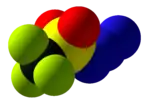Trifluoromethanesulfonyl azide
Trifluoromethanesulfonyl azide or triflyl azide CF3SO2N3 is an organic azide used as a reagent in organic synthesis.
 | |||
| |||
| Names | |||
|---|---|---|---|
| Preferred IUPAC name
Trifluoromethanesulfonyl azide | |||
| Identifiers | |||
3D model (JSmol) |
|||
| ChemSpider | |||
PubChem CID |
|||
CompTox Dashboard (EPA) |
|||
| |||
| |||
| Properties | |||
| CF3SO2N3 | |||
| Molar mass | 175.09 g·mol−1 | ||
| Melting point | 80-81 °C | ||
| insoluble[1] | |||
Except where otherwise noted, data are given for materials in their standard state (at 25 °C [77 °F], 100 kPa).
Infobox references | |||
Preparation
Trifluoromethanesulfonyl azide is not commercially available. It is prepared before use by reacting trifluoromethanesulfonic anhydride with sodium azide, traditionally in dichloromethane.[1] However, use of dichloromethane should be avoided because sodium azide is known to generate highly explosive azido-chloromethane and diazidomethane in situ by nucleophilic substitution on dichloromethane.[2] Moreover, the volatility of dichloromethane is a liability, as unsolvated triflyl azide is a detonation hazard.[2] The reaction may also be carried out in toluene,[3] acetonitrile, or pyridine.[4]
- Tf2O + NaN3 → TfN3 + NaOTf (Tf = CF3SO2)
The trifluoromethanesulfonic anhydride starting material is rather expensive, and the product is explosive, and does not store well. As a result, imidazole-1-sulfonyl azide has been developed as an alternative.[5]
Reactions
Trifluoromethanesulfonyl azide generally converts amines to azides.
References
- C. J. Cavender & V. J. Shiner (1972). "Trifluoromethanesulfonyl azide. Its reaction with alkyl amines to form alkyl azides". The Journal of Organic Chemistry. 37 (22): 3567–3569. doi:10.1021/jo00795a052.
- Cavender, C. J.; Shiner, V. J., Jr. J. Org. Chem. (1972), 37, 3567.
- Titz, A.; Radic, Z.; Schwardt, O.; Ernst, B. Tetrahedron Lett. (2006), 47, 2383.
- R.-B. Yan, F. Yang, Y. Wu, L.-H. Zhang and X.-S. Ye (2005). "An efficient and improved procedure for preparation of triflyl azide and application in catalytic diazotransfer reaction". Tetrahedron Letters. 46 (52): 8993–8995. doi:10.1016/j.tetlet.2005.10.103.
{{cite journal}}: CS1 maint: multiple names: authors list (link) - E. D. Goddard-Borger & R. V. Stick (2007). "An Efficient, Inexpensive, and Shelf-Stable Diazotransfer Reagent: Imidazole-1-sulfonyl Azide Hydrochloride". Organic Letters. 9 (19): 3797–3800. doi:10.1021/ol701581g. PMID 17713918.

